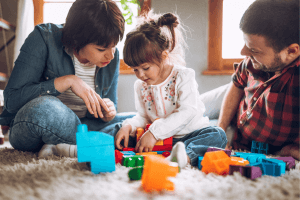Social Skills Matter
A key part of a child’s healthy growth is their social development. Early on, parents learn the importance of supporting their child’s social intelligence by helping them form positive friendships and build interpersonal skills. Still, many children struggle with relationships at a young age and parents often have concerns. When a child is diagnosed with autism, this concern only grows. Read on for tips from our associate clinical manager on how you can help your child improve their social skills.

1. Practice With Adults First
All children learn social skills with adults first, generally parents, before practicing those skills with their peers. If your child is struggling with a particular skill, provide ample opportunity to practice at home. Begin by practicing the skill in small increments and provide verbal praise when your child completes the skill
- Idea in Action: To teach your child to take turns, first sit with your child on the floor while they are playing with a preferred toy. Hold out your hand and say “my turn.” Help your child to hand you the toy if they do not do so independently. Play with the toy for 1-3 seconds and then immediately give it back to your child, paired with verbal praise like, “Thanks for giving me a turn!” Continue to do this, slowly increasing the amount of time you play with the toy before giving it back.
2. Teach Skills as Rules to Follow
Children with autism are rule followers and dislike when their day deviates from a set schedule or routine. While building flexibility is a great skill, we can also use this preference for rules and routine as a basis to teach social skills. If we continue to reinforce these social “rules”, those skills will soon become learned social skills. If a child learns the “rule” that you should say hi if someone says hi to you, they will learn the skill of how to return social greetings.
-

Idea in Action: If your child has an upcoming playdate, give them three simple rules or expectations to follow and then provide praise and rewards for following those rules. Examples of social rules to try could include:
- Say hi when someone says hi to me
- Ask one question
- Play one game my friend picks
- Ask a question about something I know my friend likes
3. Script Their Conversation
When teaching social conversational skills, it can often be helpful to teach “scripts” or specific sentences or questions they can use regularly in conversations. This can give the child a bank of social language skills to rely on when in social interactions.
 Idea in Action: Teach your child a list of six different “conversation starters” to use as opening questions after a greeting. This list may include:
Idea in Action: Teach your child a list of six different “conversation starters” to use as opening questions after a greeting. This list may include:
- “How are you?”
- “What did you do this weekend?”
- “How is your day going?”
- “Do you want to play a game with me?”
4. Provide Lots of Exposure to Peers
Another way all children learn social skills is by watching and observing their peers. In order to use and practice social skills, children must have exposure to interactions with other children. This can range from simply taking your child to a public location with other kids (i.e. playground), making sure your child is included in mainstream activities within their school setting, or setting up specific play dates.

- Idea in Action: Set up a structured play date with a sibling or a same-age peer. Set some specific expectations for your child (See “rules” section above) and settle on a reward for the end of the play date (“When we are done playing with Billy, we can watch Mickey Mouse”). Pick 3 activities, one that the peer/sibling selects, one that your child picks, and one activity that both kids equally enjoy. Provide prompting/help to interact only where your child needs it, giving them a chance to do it on their own first.
5. Embrace Your Child’s Uniqueness
Remember that there are some amazing unique strengths that can come along with an autism diagnosis. The line between teaching our children the skills they need to make friends and engage socially, and forcing our children to fit into a set mold of what we think “social” should look like, can be very fine. It’s okay for your child to be themselves and have their own interests. We often find that as children with autism get older, they actually seek out being friends with other kids with autism. Children with autism feel most comfortable with others who “get them” and share similar interests. Help your child to both gain the skills they need socially and feel loved and supported just as they are!

- Idea in Action: Get down on your child’s level and offer a hug or a high-five as you tell them, “I love you just the way you are.” It’s simple but powerful. When your child struggles with relationships, sometimes the tips above will be helpful, but other times, what your child needs most in the moment is connection with you or another trusted adult. We all need reminders that even while we are trying to grow and change, our family and friends love us just as we are.
As a parent of an autistic child, it’s normal to worry about social skills and communication. But remember, there is always hope. Your child, even with their diagnosis, is capable of positive relationships. And, good news – you are the perfect person to help them bloom into the wonderful and unique friend, partner, co-worker and community member they were born to become.
By Sarah Deland, BCBA, LBA, LMSW – Associate Clinical Manager
______________
Judson Center’s Autism Connections is a preferred provider for diagnostics and early intervention. We have immediate daytime openings available at several locations.
We can help prepare for the school year. Autism Connections offers transportation to and from school, works collaboratively with administrators and teachers to help guide and formulate your child’s IEP.
Contact us today to learn more about Autism Connections.
Learn More:
Visit us online to learn more about future social skills groups.
